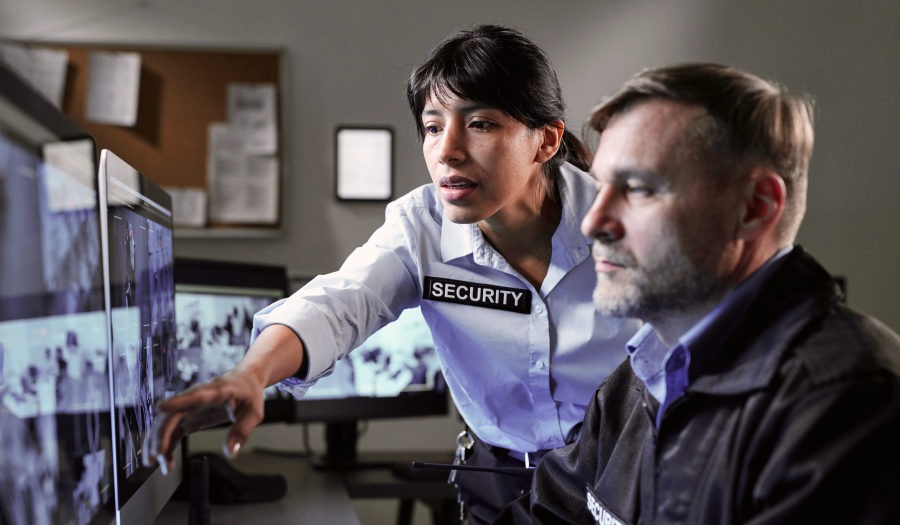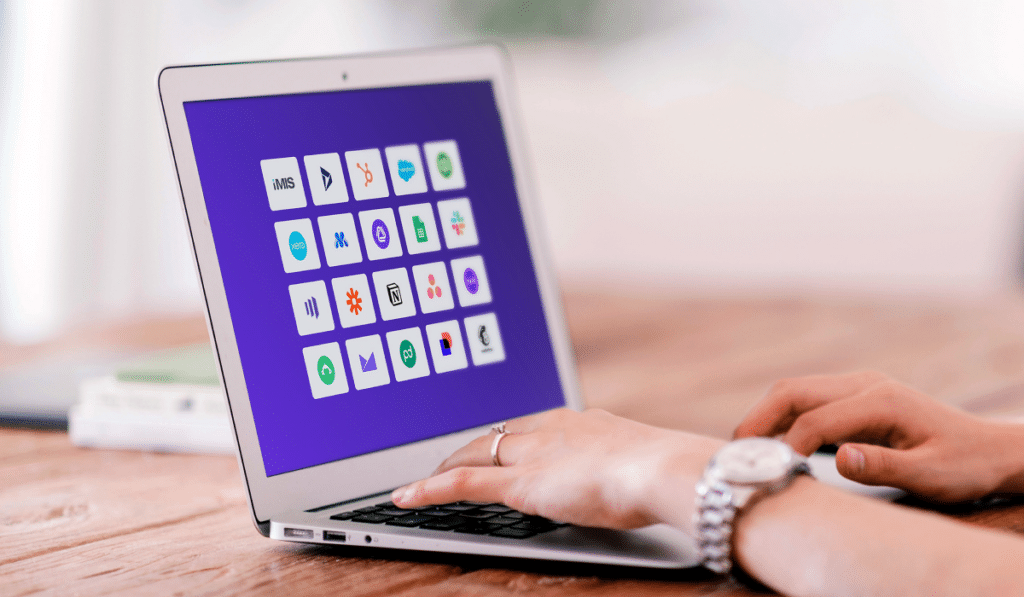The event management technology trends changing the industry

Event organizers might be facing high inflation and budget pressure, but current event technology is still enabling exceptional experiences. Breakthroughs in event management software and cloud-based platforms are giving event teams new ways to collaborate. Event apps are also streamlining the entire event experience and helping attendees and exhibitors network like never before.
If you want to push the limits at your next event, then take a deep dive into our breakdown of the latest event management technology trends and how they will help us realize some of the biggest opportunities in the events industry.
What is event technology?
Event technology is any tool that enables people to plan and deliver events. It is continuously improving over time and many of the latest breakthroughs in artificial intelligence and digitization are rapidly spilling over into the event management industry.
Upcoming event technology trends:
Technology trends in event management are transforming how organizers bring people together and deliver experiences.
Some of these new tools and technology in event management include:
- Event management software that streamlines event planning, promotion, execution, and measurement.
- AI that speeds up event marketing, multimedia creation, and customer service.
- RFID replaces event tickets and physical payments while streamlining sponsorship activation.
- Event mobile apps that distribute information and orchestrate key moments.
- QR codes that provide quick access to information and experiences.
- Live streams that connect in-person and virtual events.
- Floor plan diagramming software that enhances event layouts.
- Smart wearable devices that enable the easy transfer of information and event data.
- Holograms that showcase products and speakers in exciting ways.
- Virtual reality experiences that enhance attendee engagement.
- Integrations that connect data between events, memberships, customers, teams, and more to save time and enhance attendee experiences.
The benefits of new event technology trends:
New technology trends in event management are making it far easier to plan and execute events. They are also creating new sources of data that can be used to measure and optimize the entire experience.
Let’s explore the changing role of technology in event management and the benefits it’s helping us realize:
- Improving event ROI
- Hosting more inclusive events
- Removing event participation barriers
- Building tight-knit communities
- Smoothing out friction points
- Hosting more sustainable events
- Increasing knowledge sharing
- Creating more hype for events
- Delivering seamless attendee experiences
- Creating better events with automation
Improving event ROI
A lot of time, effort, and investment can go into organizing an event and technology is opening up new ways to deliver a better ROI. Luckily, there have never been so many ways to monetize your events.
By capturing content from the event and hosting it on other platforms, you can extend its lifecycle and charge people for access to the virtual format. Or, if your lucky enough to partner with a technology provider that can capture and host your event content, then it’s a win-win. There are also now plenty of plug-and-play platforms you can use to sell merchandise and increase memberships.
Hosting more inclusive events
It’s important to make all our guests feel welcome, no matter who they are or where they are from. Event management software is making it easier for organizers to gain data-driven insights about their audiences and cater to them ahead of time.
By running surveys about requirements and expectations in the lead-up to the event, planners can prepare for guests who need special considerations. This gives everyone access to the same experiences regardless of their background or abilities. If you want to go the extra mile, you can even use predictive analytics powered by AI to proactively anticipate attendee needs and preferences.
If you have captured the right data points, you can also personalize each individual’s experience. Imagine being greeted by a personalized message on digital signage the next time you attend an event. These small touches can make the event much more rewarding for everyone involved. They are also easy to achieve with the right event technology and data capture strategy in place.
Removing event participation barriers
The ability for events to transcend geographic boundaries has stuck since the COVID-19 pandemic and many event organizers are offering innovative blends of face-to-face and virtual event experiences. For example, it’s becoming easier to livestream keynote presentations so even more people can join the experience online.
Translation tools are also becoming more advanced and can translate the written or spoken word almost in real-time. AI chatbots can also engage with guests outside of hours or when event planning staff are occupied.
Building tight-knit communities
How many times have you been to an event and felt like you didn’t speak to enough people? Have you ever had an in-depth conversation with someone you connected with, but failed to exchange contact information?
Event management technology is bridging the gap in these networking opportunities. Event apps are making it easier for guests to share information and continue their conversations post-event.
Wearable technology can also facilitate the swift exchange of contact information and AI-driven matchmaking tools can even be used to connect attendees with complementary interests and goals.
Smoothing out friction points
We want our guests to have a good time and contactless technology removes friction points from the event experience. Self and digital check-in options are a great solution for long registration lines. QR code technology can also be used in countless ways to easily connect guests with digital experiences, all facilitated by their mobile devices.
NFC-enabled wristbands and digital business cards also facilitate smooth and convenient interactions. Their data can also be used to create heat maps of high-traffic areas, helping organizers design more engaging and easy-to-navigate layouts.
Event management software also automates delivery schedules, venue set-up, and vendor coordination, making these processes far less time-consuming.
Hosting more sustainable events
Environmental consciousness is front of mind for many people and the events industry has the opportunity to lead by example. Many of the tools that event planners previously used were paper-based, but digital event technology platforms are now streamlining operations and reducing waste. Name tags could also be replaced by biometrics in the near future and digital products can be used in place of single-use event merchandise.
Increasing knowledge sharing
Keynote speeches and group activities have always been a big drawcard for events because people love connecting to gain new knowledge, perspectives, and insights. However, how we share knowledge at events is advancing. Showing is always better than telling and virtual reality experiences are becoming one of the best ways to engage event audiences. They allow presenters to invite people into their interactive worlds.
Live polls and Q&As can also be used for brainstorming or gaining feedback on a subject quickly, providing guests with insights from their peers during the event. Interactive technologies like touchscreens, livestreams, kiosks, gamification, and digital signage can also create dynamic environments that encourage exploration and discovery. Using an innovative set-up, you could also enable your guests to choose their own event journey.
Creating more hype for events
The media landscape is fragmented and there is a lot of competition for people’s attention on social media. That’s why organizers need sophisticated event marketing technology.
AI-driven audience targeting tools are making it easier to engage with the right audience on digital communication channels. Event organizers are also tapping into simple video editing interfaces fueled by AI to create high-impact videos.
If this sounds a little too advanced – ensuring your event management technology is equipped with powerful segmentation and targeting will allow you to achieve a more meaningful, personalized approach.
Delivering seamless attendee experiences
Event managers are getting better at sharing organization and event data. For example, using open APIs and integrations, they can connect their CRM with their event management platform. Check-in forms can be pre-filled to save attendees time and reduce lineups. Segmented communications can be sent to event guests depending on their registration or membership tier. Teams can also be kept in the loop by sending event information to their preferred project management tool. There are endless opportunities to use data to get your events working in sync with the rest of your business.
Creating better events with automation
More and more event management workflows are being mapped and automated. This is because event management automations [1] can reduce your team’s workload, prevent errors from occurring, and help you focus on the big picture of your event rather than the minor details. For example, you can create set-and-forget communications to drive event registrations and payment via marketing automation. You can also use an event management platform to automate catering counts. Alerts and notifications can also be automatically sent to your team, so the entire event is orchestrated seamlessly.
Examples of current event technology in use:
ASEAN-Australia Summit
The ASEAN-Australia Special Summit in March 2024 was the largest diplomatic gathering of world leaders in Australia since 2018. The focus of the event was on fostering economic, political, and cultural cooperation, which meant the latest event management technology trends and tools needed to be harnessed to manage over 6,500 attendees and security protocols.
To create efficiency for the high-profile guest list and meet stringent security requirements, photo ID security passes with an RFID mechanism embedded in them were given to all attendees on-site. Prior to entering the building, ASEAN attendees walked through RFID gates or were scanned by mobile RFID readers to confirm their identity quickly.
Tata Consultancy Services (TCS) Summit Europe
The TCS Summit Europe brings together the UK and Europe’s most senior business leaders. When more than 300 C-Suite executives gathered for three days in Barcelona to learn from global influencers in politics, sports, and business, the organizers wanted to ensure that their check-in was seamless.
They integrated Klay Event Technology’s contactless, onsite, self check-in kiosks with the EventsAir platform. This meant delegates could check themselves in from one of the kiosks in their own time. The integration and real-time reporting features also enabled badges to be printed on demand. Using new event technology, check-in became much faster and smoother. From a sustainability perspective, paper wastage was also reduced as badges didn’t need to be reprinted due to human error.
Kuoni Tumlare
Cedric Cholley from Kuoni Tumlare was awarded EventsAir’s Innovator of the Year Award. He is also a web developer and event planner who constantly embraces innovative event technology trends.
He continuously identifies new automations and event workflow improvements by collaborating, ideating, brainstorming, and planning with his team. By making scripts for the bespoke solutions that come out of these sessions, he has created many event management automations that boost efficiency and save time. For example, he successfully migrated a colossal congress program with 13 parallel streams and 400 sessions over five days into EventsAir, allowing organizers to easily manage the program. He has also created a custom presentation tool that triggers alerts for organizers via SMS when speakers haven’t submitted their presentations.
Our imagination is the only limit
Technology has already made a significant impact on the event management industry and we can expect to see even more innovations in the future. From VR to contactless solutions and AI, event management technology will continue to transform every aspect of the event experience.
At EventsAir, we understand the importance of selecting the right event technology partner – someone who can help you deliver successful, inspiring events both today and in the future. We’ve been innovating in the events industry for more than 30 years, and events are at the core of our DNA.
Thanks to our rich heritage, we also understand what’s next for the events industry. It’s the reason why serious event planners around the world choose our industry-leading event technology platform.
If you would like to understand how we can help you unleash the power of event planning technology for your team, then schedule a demo with one of our team members today.



